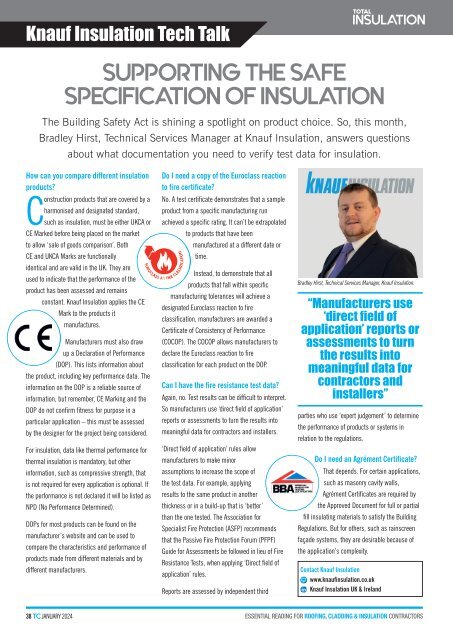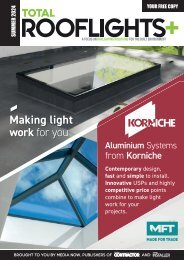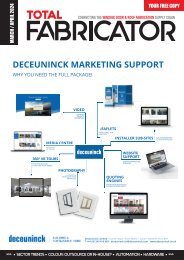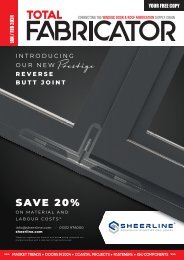January 2024
Create successful ePaper yourself
Turn your PDF publications into a flip-book with our unique Google optimized e-Paper software.
Knauf Insulation Tech Talk<br />
SUPPORTING THE SAFE<br />
SPECIFICATION OF INSULATION<br />
The Building Safety Act is shining a spotlight on product choice. So, this month,<br />
Bradley Hirst, Technical Services Manager at Knauf Insulation, answers questions<br />
about what documentation you need to verify test data for insulation.<br />
How can you compare different insulation<br />
products?<br />
Construction products that are covered by a<br />
harmonised and designated standard,<br />
such as insulation, must be either UKCA or<br />
CE Marked before being placed on the market<br />
to allow ‘sale of goods comparison’. Both<br />
CE and UKCA Marks are functionally<br />
identical and are valid in the UK. They are<br />
used to indicate that the performance of the<br />
product has been assessed and remains<br />
constant. Knauf Insulation applies the CE<br />
Mark to the products it<br />
manufactures.<br />
Manufacturers must also draw<br />
up a Declaration of Performance<br />
(DOP). This lists information about<br />
the product, including key performance data. The<br />
information on the DOP is a reliable source of<br />
information, but remember, CE Marking and the<br />
DOP do not confirm fitness for purpose in a<br />
particular application – this must be assessed<br />
by the designer for the project being considered.<br />
For insulation, data like thermal performance for<br />
thermal insulation is mandatory, but other<br />
information, such as compressive strength, that<br />
is not required for every application is optional. If<br />
the performance is not declared it will be listed as<br />
NPD (No Performance Determined).<br />
DOPs for most products can be found on the<br />
manufacturer’s website and can be used to<br />
compare the characteristics and performance of<br />
products made from different materials and by<br />
different manufacturers.<br />
Do I need a copy of the Euroclass reaction<br />
to fire certificate?<br />
No. A test certificate demonstrates that a sample<br />
product from a specific manufacturing run<br />
achieved a specific rating. It can’t be extrapolated<br />
to products that have been<br />
manufactured at a different date or<br />
time.<br />
Instead, to demonstrate that all<br />
products that fall within specific<br />
manufacturing tolerances will achieve a<br />
designated Euroclass reaction to fire<br />
classification, manufacturers are awarded a<br />
Certificate of Consistency of Performance<br />
(COCOP). The COCOP allows manufacturers to<br />
declare the Euroclass reaction to fire<br />
classification for each product on the DOP.<br />
Can I have the fire resistance test data?<br />
Again, no. Test results can be difficult to interpret.<br />
So manufacturers use ‘direct field of application’<br />
reports or assessments to turn the results into<br />
meaningful data for contractors and installers.<br />
‘Direct field of application’ rules allow<br />
manufacturers to make minor<br />
assumptions to increase the scope of<br />
the test data. For example, applying<br />
results to the same product in another<br />
thickness or in a build-up that is ‘better’<br />
than the one tested. The Association for<br />
Specialist Fire Protection (ASFP) recommends<br />
that the Passive Fire Protection Forum (PFPF)<br />
Guide for Assessments be followed in lieu of Fire<br />
Resistance Tests, when applying ‘Direct field of<br />
application’ rules.<br />
Reports are assessed by independent third<br />
Bradley Hirst, Technical Services Manager, Knauf Insulation.<br />
“Manufacturers use<br />
‘direct field of<br />
application’ reports or<br />
assessments to turn<br />
the results into<br />
meaningful data for<br />
contractors and<br />
installers”<br />
parties who use ‘expert judgement’ to determine<br />
the performance of products or systems in<br />
relation to the regulations.<br />
Do I need an Agrément Certificate?<br />
That depends. For certain applications,<br />
such as masonry cavity walls,<br />
Agrément Certificates are required by<br />
the Approved Document for full or partial<br />
fill insulating materials to satisfy the Building<br />
Regulations. But for others, such as rainscreen<br />
façade systems, they are desirable because of<br />
the application’s complexity.<br />
Contact Knauf Insulation<br />
www.knaufinsulation.co.uk<br />
Knauf Insulation UK & Ireland<br />
38 TC JANUARY <strong>2024</strong>
















